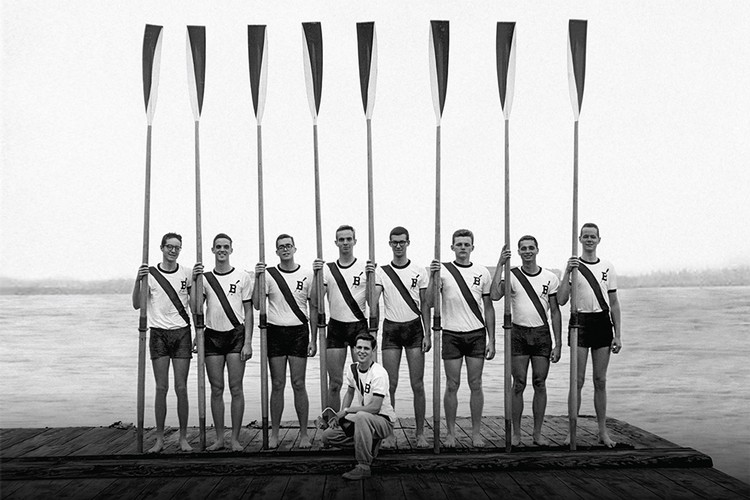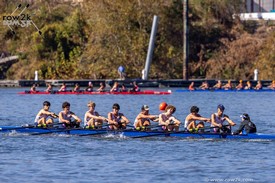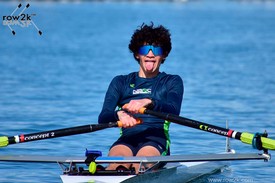
Did it ever occur to the persons who arranged our naval sojourn that perhaps Navy did not want us to become the U.S. Olympic Crew?
Am I being unfair to Coach Pratt, who did nice things to make us go fast? Possibly. My best racing weight was 182 but for the first of our two trials I weighed 164 not to mention that my back was out of joint.
Worse, Coach Pratt switched Phil Makanna and me so that one time in my four years I rowed in the two-seat-- fatal! Coach Pratt may have had an imperfect understanding of idiosyncrasy. As Charlie Butt realized, you could tweak the Brown Cinderella Crew but not overhaul it.

Pratt's theory was that our starboard side was ten pounds per man heavier than our port side and pulled us around. Which meant that Mouse to go straight had to use rudder which slowed us down.
Never mind that the venerable crew coach of Marietta College Ralph Lindamood said that Mouse (Richard MacKenzie) was the shrewdest and best-steering coxswain he ever saw in his whole life. Mouse had a light touch on the rudder ropes is what I am trying to say.

Since I was three inches taller than Phil, Coach Pratt reasoned, I could put extra length on my catch to pry the boat sideways thus requiring less rudder.
In a nanosecond the famous retired Washington and Harvard coach and Athletic Director Tom Bolles discovered this finesse at the first annual Brown-Harvard race the following Spring.
He was the man who taught Joe Rantz how to row in the book about UW crew in the 1936 Olympics THE BOYS IN THE BOAT.
He came up to us on the Boston side of the Charles and said, "You fellows might have won that race if you weren't so long at the catch that you were pressing your gunwales together."
Another change Coach Pratt oversaw was substituting the eight steel frames that hold each oarlock called "riggers" from our new boat the Hunter for the corroded ones of the Stein.
We'd rowed the Hunter a few times but noticed a great change in boat personality we were not ready for-- not with the Olympic Trials coming up.
Switching out the corroded riggers seemed a good move but wasn't. Because the Hunter's riggers were designed for the Hunter and were a different size with the result that Bill Engeman no longer could drive the stroke up into the stratosphere.
But it's too easy in rowing to be paranoid. The famous nineteenth century example of paranoia principle-- "if you're not paranoid then you don't know what's going on"-- occurred in northern New England the night before a money race between two single scullers. On race day the one sculler came out from where he had been sleeping to discover his boat sawed in half.
Similarly, some of us heard a terrible rumor that when our new boat the Hunter first arrived in Boston having traversed the country from Seattle in a trainload of right coast designated Pocock cedar racing shells, a Massachusetts oarsman (we don't know from which school) arrived at the box car before anyone else and switched some labels.
My paranoid thinking will persist through the rest of my life no matter how I try to reason with it. Were we for the entirety of our senior year heavyweights in a lightweights' shell sitting too low in the water? And this was why we could only beat Yale but not the other crews in the 1961 Eastern Sprints final?
On the other hand the Hunter was the boat used by the first Title Nine woman's varsity at Brown, coached by our teammate Peter Amram, and the women found it-- the Hunter-- too heavy for them.
So we will never know how bad or appropriate a boat the Hunter was but I can guess. We finished seventh in the 1961 three-mile IRA nipped by Navy for sixth by the exact same margin as at the 1959 Eastern Sprints, two tenths of a second.
The 1960 Olympic Trials were similar anti-climax for us. We led in both of our races but faded and were beaten by crews we had beaten three weeks before.
The most notable aspect of this aside from us being there-- thanks Mr. Avery Brundage head of the international Olympic rowing committee-- was trash talk in the other boat while Penn and Brown were lined up before the start of our two-boat repechage for final elimination.

As a subsequent crew coach, I hate trash talk which to my mind is any talk between contestants just before a race. Why not let oarsmanship speak instead? We or maybe just I had read a Sports Illustrated article about an early Spring dual race between Penn and Harvard in which Penn had unnerved favored Harvard simply by carrying on a supposedly civil conversation with them as the two boats floated side by side.

We anticipated this psyche job and got it and it wasn't nice. But how could Penn, who already had done us big favors, reform from any bad behavior in the length of a single season?
And then in the first modern Brown-Harvard race-- between eights-- we encountered the same phenomenon only from Harvard this time, as if to say, "This is how it's going to be, Brown. Welcome to the Big League."
I doubt very much that either Tom Bolles, who as Athletic Director picked Harvey Love to be varsity coach, or Love himself told the oarsmen to speak to us that way. The Harvard sports administration had decided to lift Brown Crew up, not press it down.
The Hunter took a lead early and Mouse cried, "I've got the seven-man, give me..."
And the Harvard coxswain, interrupting, turned his head megaphone toward us and remarked, "Like hell you do."
Oh well, thirty years later in Front Royal, Virginia, John Higginson the Harvard six-man bought a series of tennis lessons from me.
We weren't destined to be the top crew in the land but we could be king of all the Dad Vail crews in the land. And as any Dad Vail championship crew can tell you, the race organizers will treat you like royalty with banquet food and drink and perhaps a commemorative trophy along with a Dad Vail pin even if fifty or sixty years pass before you go back.
If you enjoy and rely on row2k, we need your help to be able to keep doing all this. Though row2k sometimes looks like a big, outside-funded operation, it mainly runs on enthusiasm and grit. Help us keep it coming, thank you! Learn more.
Comments | Log in to comment |
There are no Comments yet
| |
- Bont Rowing
- Calm Waters Rowing
- Concept 2
- Craftsbury Sculling
- The Crew Classic
- CrewLAB
- Croker
- Durham Boat Co.
- Empacher
- Faster Masters
- Filippi
- Fluidesign
- h2row.net
- HUDSON
- Live2Row Studios
- Nielsen-Kellerman
- Oak Ridge RA
- Peinert Boat Works
- Pocock Racing Shells
- Race1 USA
- RowKraft
- Rubini Jewelers
- Vespoli USA
- WinTech Racing
- Bont Rowing
- Calm Waters Rowing
- Concept 2
- Craftsbury Sculling
- The Crew Classic
- CrewLAB
- Croker
- Durham Boat Co.
- Empacher
- Faster Masters
- Filippi
- Fluidesign
- h2row.net
- HUDSON
- Live2Row Studios
- Nielsen-Kellerman
- Oak Ridge RA
- Peinert Boat Works
- Pocock Racing Shells
- Race1 USA
- RowKraft
- Rubini Jewelers
- Vespoli USA
- WinTech Racing

















